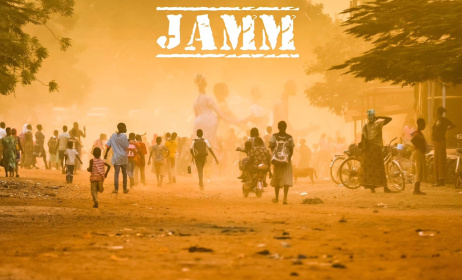New book tells of Lucky Dube's spiritual message
 South African reggae singer Lucky Dube.
South African reggae singer Lucky Dube. The cover of the Lenah Mochoele's book.
The cover of the Lenah Mochoele's book.
Biographies on prominent South African artists are a rarity. Reasons for this unfortunate and embarrassing state of affairs vary. Potential biographers with a track record in arts and culture journalism complain that black South African musicians in particular are reluctant to tell their stories. Some musicians argue that there are few competent and professional writers who can do justice to their life stories in book form.
Whatever the reasons the late Lucky Dube’s life and achievements were so compelling it was only a matter of time for his biography to be published. After all, he was not only a great commercial success musically and artistically, he was also blessed with a remarkable charismatic personality and left a lasting impression on those who were lucky enough to have crossed his path. The first biography, Crazy World: The Life & Career of Lucky Dube, was published in 1997 by the little known KwaZulu-Natal-based Reach Out Publishers.
Despite its literary brilliance, it received little attention as its subject was becoming more popular on the stages of the continent and the rest of the world than at home. Author Guy Henderson, a Gallo executive and accountant who became Lucky’s tour manager in the West, says the main reason he decided to write the king of reggae’s biography was because he has achieved phenomenally as a recording artists and a performing star. “It was a story that had to be told. The life and achievements of Lucky Dube really do constitute a South African dream,” he explains.
The latest literary contribution on Lucky Dube’s life and legacy, Walking A Mile In Your Shoes: My Spiritual Journey With Lucky Dube by Lenah Mochoele is a very personalised account that employs a variety of literary devices including poetry, sermons, speeches, songs, newspaper reports and motivation.
Like Henderson, Mochoele was the singer’s tour manager on African destinations and therefore the book has a ring of honesty and authenticity to it. Like Dube, the author was brought up with strong Christian values and poignantly reflects both their religious outlook in the book. Although Walking A Mile is not a biography in the classic sense of the word, this book is a powerful testimony not only about Lucky’s remarkable musicianship and powerful messages through his music, but also about his strong cultural and spiritual values – values that defined his sense of morality and political outlook as a fighter for social justice.
She recalls special moments they shared together during their travels across the continent and how the artist became her spiritual guru and cultural mentor. “I have inherited from Lucky the courage to embrace my culture,” she explains in the preface as a motivation why she wrote the book. “I am passing this on to the next generations so they will know who we are, where we come from so they can use this light to show themselves the way forward.”
She continues: “While our traditions are not recognised as sources of substance regardless of the rich wisdom they represent, we should strive to instil our culture in the young ones for culture represents responsibility.” Walking A Mile In Your Shoes: My Spiritual Journey With Lucky Dube is a powerful reminder that South Africans should deal the tendency to forget easily and treasure its own cultural icons, because by doing so they will be embracing their culture, identity and unique place in the world as a country that gave birth to other global icons like Miriam Makeba, Hugh Masekela and Caiphus Semenya.
That is why Lenah Mochoele’s book is a welcome addition to the sparse bibliography of South African music. The author should be commended for reminding all of us about the need to be proudly African through true cultural heroes such as Lucky Dube. Walking A Mile is an extraordinary work of non-fiction I have had the honour and privilege to read about a remarkable person who touched millions of people across the world in a very special way. It should spur other writers – particularly music journalists – to make their contribution.
* Originally published as ‘A journey with lucky Mr Dube’ in the African Independent on 4 September 2015.




























Commentaires
s'identifier or register to post comments